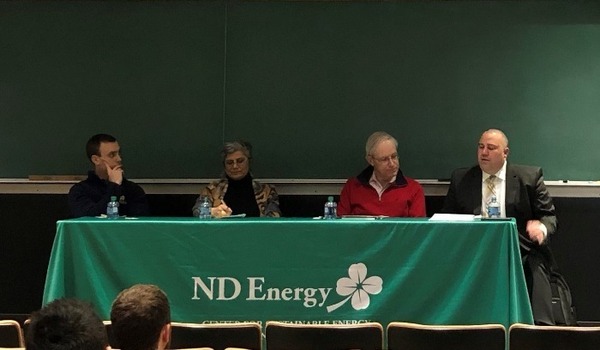
On March 20, ND Energy sponsored a panel discussion on the future of STEM graduate students and Notre Dame’s role in preparing them for careers in both academia and industry. “Divergent Exit Opportunities for STEM Graduate Students: Leveraging On-Campus Resources” featured Ph.D. candidate Samuel VandenHeuvel from the Sevov Group in the Department of Chemistry and Biochemistry; Professor Ani Aprahamian, the Frank M. Freimann Professor of Physics; Professor Thomas Degnan, the Anthony and Sarah Earley Professor of Energy and the Environment in the Department of Chemical and Biomolecular Engineering; and Ryan Willerton, Associate Vice President for Career and Professional Development in the Division of Student Affairs.
VandenHeuvel, who initiated the idea for the panel, began by describing his personal path through Notre Dame’s graduate student process. As he became aware of the fact that he didn’t want to remain in academia for the rest of his career, he realized that he was behind on the “soft skills” he would need to succeed outside of it. Although he had solid research, technical writing, and presentation experiences, he lacked a history of leadership and general audience presentations. Sam began rounding out his education by taking undergraduate courses in fields outside his major and getting involved in clubs and volunteer opportunities on and off campus. He recommended that graduate students get involved with opportunities such as the “Three Minute Thesis” competition and the Notre Dame alumni network. He also suggested that in some cases it would be useful to have a third party advisor, unconnected to the lab environment, to help with professional development.
Professor Aprahamian explained that in her area of STEM, experimental nuclear physics, there is a lot of collaboration and many opportunities to develop skills that translate well to industry. Broad background knowledge of finance, materials, securities, even health applications are built into the graduate experience for her team. She gave the example of talking to members of Congress to encourage funding as a skill that is transferable to work outside of academia. Graduate students from her lab have gone on to academia, national laboratories, and industry in equal numbers. She recommended that graduate students talk to their advisors about their goals and be flexible in their career path. As she explained, “Plans can and will change; I was originally going to be a dentist.”
Professor Degnan began with some statistics on the job outlook for STEM doctorates in industry and shared his experience as a member of the National Academies’ Panel on Challenges in Chemistry Graduate Education. From his former role as a recruiter for industry, he stressed the importance of person-to-person skills. Can the recruit contribute to a diverse team, many who will have very limited technical knowledge? Does he/she have leadership skills with experience leading from behind? An understanding of economics and profits enhances one’s chances of landing a job in industry, in addition to the ability to ask great questions and think critically. Larger companies often have established relationships with certain universities and professors, so graduate students should work to network with senior researchers and leaders on campus. And once hired, having a mentor can help you understand the lay of the land and contribute to your success.
Ryan Willerton was appointed Associate Vice President for Career and Professional Development this past August and has reorganized his department into four teams with employer engagement being a new emphasis. There will be more of an effort to “sell” Notre Dame graduate students to industry partners, especially those that might have been exclusively interested in undergraduates in the past. He is also hiring career counselors who will be dedicated to specific fields: engineering, science, arts and letters, and master degree programs. Willerton encouraged all graduate students to visit the new graduate career development space on the fifth floor of the Duncan Student Center. He also encouraged them to use Irish Compass, the new online platform, to foster connections with Notre Dame alumni and seek career-related advice. Willerton wants input from students about their professional development needs. “We’re all here for you. Whatever is needed, we now have the infrastructure in place to make it happen.”
During the hour-long conversation, many resources for STEM graduate students were mentioned, including Irish Compass, where there are over 500 alumni signed up to serve as mentors or contacts in the area of Energy and the Environment alone. Participation and networking through academic societies is another opportunity to meet potential leads. The insertion of internships in industry for graduate students as a way of diversifying post-graduate options was discussed, but seemed not as practical due to the knowledge-specific and intensive work that is inherent in most laboratory work. The overall consensus was that STEM graduate students need to become more well-rounded by developing the “soft skills” that are not often required for their majors. Taking advantage of the wide range of courses and clubs on campus, establishing networks with professors and alumni, and becoming involved in the community through volunteer opportunities will help prepare help graduate students for all types of careers and could even open doors to pathways that might be unexpected.
ND Energy is a University Research Center whose mission is to build a better world by creating new energy technologies and systems and educating individuals to help solve the most critical energy challenges facing our world today. For more information, visit the ND Energy website at energy.nd.edu or contact Barbara Villarosa, Business and Communications Program Director, at bvillaro@nd.edu or 574-631-4776.
Originally published by at energy.nd.edu on April 03, 2018.